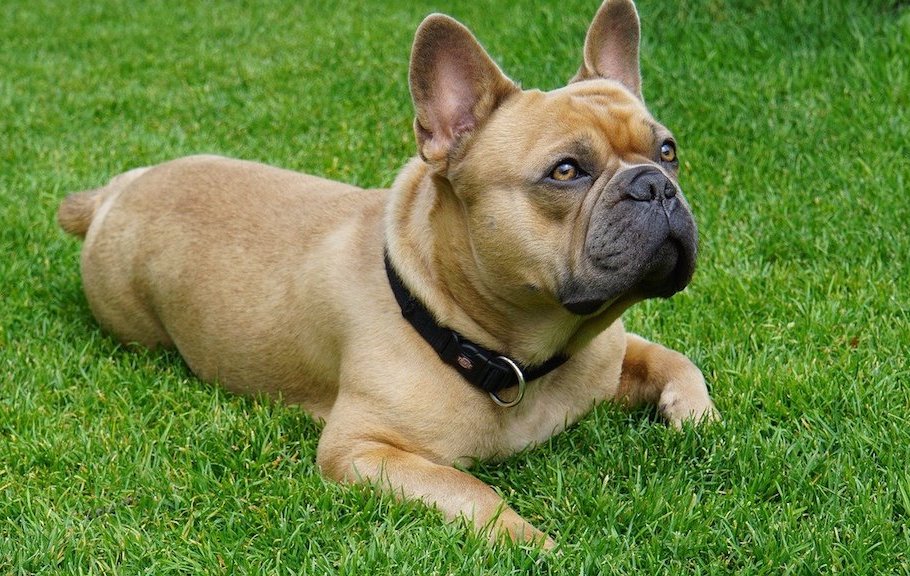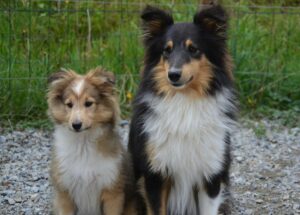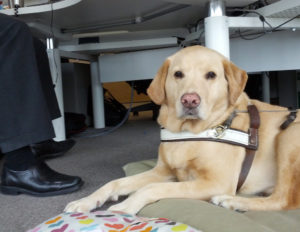Description
French Bulldogs have a compact muscular body and short strong legs. They have a large head with a flat skull, a short nose and unusual bat-like ears. Although they are classed as a small breed they are more muscular and powerful than most small dogs, with a wide thick-set body. The face of a French Bulldog might not win any beauty contests but it is adorable in its own way. ‘Frenchie’ owners often fall in love with the comical expressions created by the unusual facial features and loose skin around the head.
The French Bulldog has an intelligent, inquisitive and playful personality, which makes training them a fun and easy task. They do not require high amounts of exercise, preferring short high-intensity bursts of play followed by long periods of rest. They are also exceptionally lovable, enjoying human company and affection above all things.
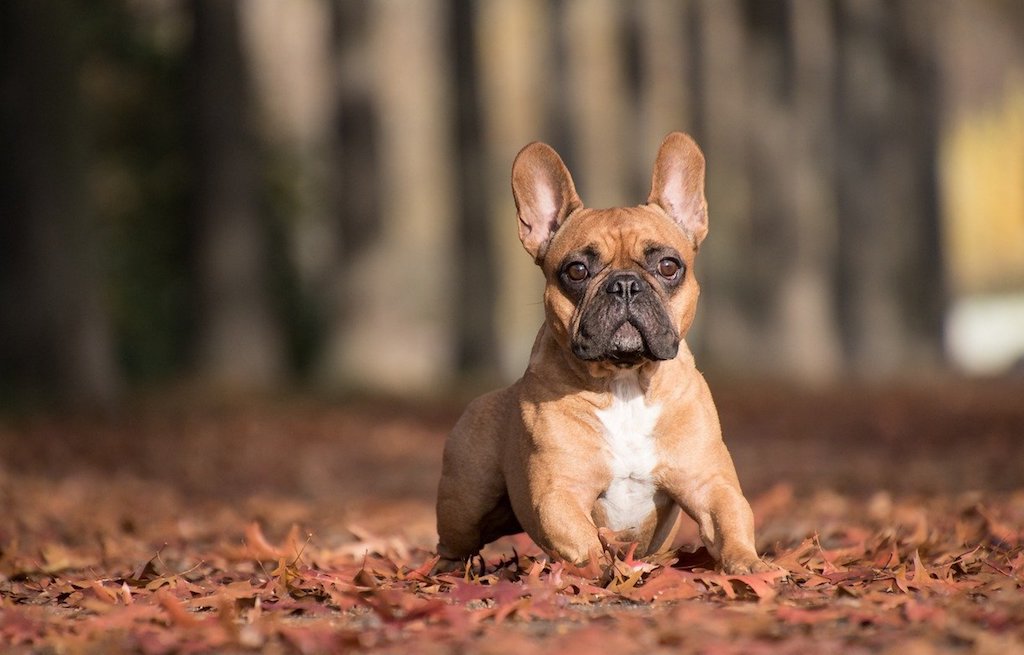
Common health problems
Unfortunately, the genetic make-up and unusual body shape of the French Bulldog means that they are predisposed to several health problems:
Breathing problems
French Bulldogs are a bracycephalic breed, meaning that they have a short stubby nose. This means that they are more at risk of contracting an upper respiratory tract infection (URT). This anatomy also means that they are at high risk of suffering from Brachycephalic Obstructive Airway Syndrome (BOAS).
BOAS occurs when short-nosed dogs struggle to inhale enough air due to anatomical obstructions in the respiratory tract. Dogs with BOAS will have difficulty breathing, especially when exercising or in hot weather. They may also pant and snore more than other dogs.
Skin problems
The folds of skin around the face of a French Bulldog can trap bacteria, heat and moisture – the magic recipe for dermatitis! Dermatitis causes itching and sore skin, and may also lead to a bacterial skin infection. French Bulldogs are also one of the high-risk breeds for allergies, which can lead to the development of skin problems.
Ear problems
French Bulldogs are very susceptible to ear infections. They have a narrow ear canal which can become easily inflamed or blocked, making it difficult to clean. Signs of ear infections include head shaking, scratching the ears, reddening of the ear and smelly discharge.
This breed’s predisposition to skin allergies can also lead to an increased risk of ear infections. Allergic reactions cause the ear canal to swell, and an excessive amount of wax will be produced and become trapped. This can lead to long-term narrowing of the ear canal and even rupture of the eardrum.
Digestive problems
French Bulldogs are notorious for their sensitive digestive systems. Parasites or infections may cause prolonged bouts of vomiting and diarrhea. Allergies can also cause digestive problems in French Bulldogs, with many suffering from food allergies which can cause digestive upsets.
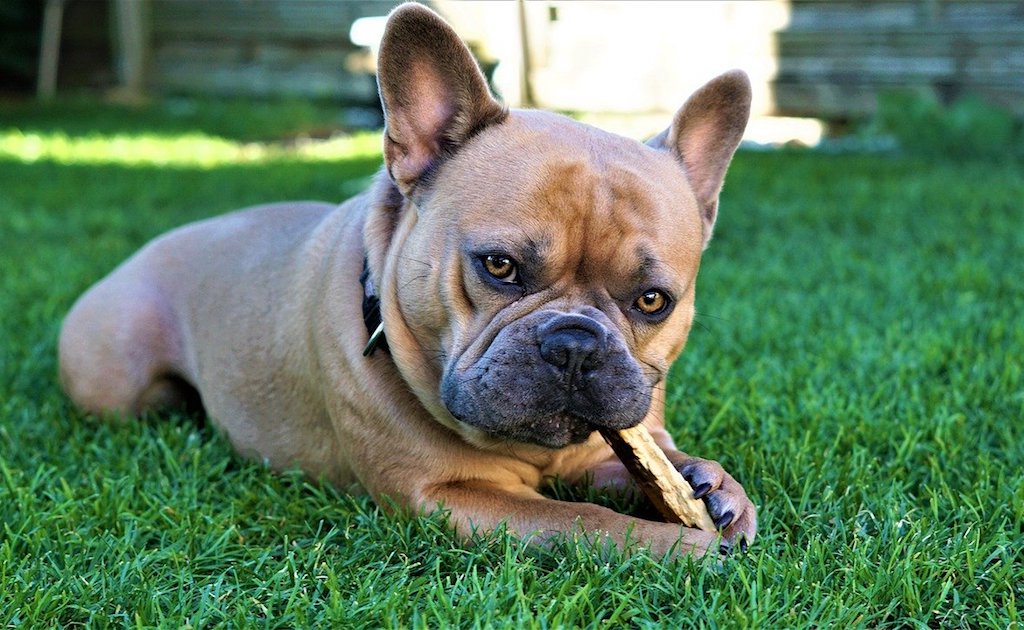
Mobility problems
French Bulldogs can suffer from similar mobility problems to many other pedigree breeds. These include hip dysplasia, degenerative myelopathy, luxating patella and spinal problems.
Personality traits
French Bulldogs make the most adorable pets – their favorite thing in the world is human attention! They will often actively seek to spend time with their owners, content just to be in human company. These pets often prefer to be the only dog in the household, becoming jealous of attention given to other pets or family members. They are very rarely aggressive but do like to make sure to let their owners know when they don’t feel that they are getting enough attention.
Although very intelligent and easy to train, French Bulldogs are not renowned for their obedience. They like fun activities and can learn new tricks quickly, but are easily distracted. Frenchies are also notorious for being stubborn, so if they don’t want to do something be prepared for some prolonged training sessions!
Care
French Bulldogs are generally quite easy to care for. They don’t demand much in the way of exercise, and their most important need is human company. They do however have some breed-specific care needs to help prevent health problems.
Grooming
French Bulldogs have a short smooth coat which is easy to maintain. A weekly groom with a soft brush will be sufficient to remove loose hair and keep the skin healthy. In the spring and autumn Frenchies will shed their undercoat, a grooming mitt is useful to remove these finer hairs.
The main problem with French Bulldogs is their loose skin folds, which can chafe and also trap moisture and bacteria. These wrinkles should be wiped thoroughly with a damp cloth to remove built-up dirt. They should then be dried thoroughly. Repeat this process at least once a week. The key areas for wrinkles are around the head and neck, the top of the tail and around the vulva.
It is also important to keep the eyes and ears clean to prevent infections. Wipe the eyes two or three times a week with a clean damp cloth to remove debris. Your veterinarian will be able to advise on ear cleaning routines but if in doubt stick to simply wiping dirt away from the outer ear. Cleaning inside the ear without proper training can potentially cause harm to your dog.
As these are dogs which tend not to need much exercise, ensure that the nails are trimmed regularly to keep them healthy. Brush the teeth frequently to maintain good dental health.
Training
Frenchies are a fairly unique combination of personality types, as they are keen to please but also stubborn! This can make training them a tricky experience, but keep it fun and reward-based and you will soon see results.
Although French Bulldogs are affectionate and loving dogs, they can be wary of new humans or dogs. Socialisation training is important from an early age. As soon as your new puppy is settled into your home they should start to meet different people, and new dogs can be introduced once your puppy is safely vaccinated.
One of the best tips when training a Frenchie is to exploit their playful nature – make training into a game and keep it fun. Carrying out training exercises on a leash can help prevent them becoming distracted and wandering off.
It is also important to start toilet training from a young age, and you may find this take time and patience to get right. Frenchies have a small bladder and need frequent toilet breaks. They are also easily distracted and may forget the task in hand when taken out for the toilet.

Exercise
French Bulldogs are often kept as city or apartment dogs, as they have relatively low exercise requirements. They will be playful inside the house, entertaining themselves with toys or bouncing up onto the furniture. Often a short walk is sufficient, and Frenchies can have a low tolerance to strenuous or extended exercise.
It is important to remember that French Bulldogs can frequently suffer from breathing difficulties, especially when exercising. Do not exercise them on hot days or if they are panting excessively. Build up exercise levels slowly and stop immediately if they are struggling – French Bulldogs are not the type of dog to accompany you on a long run every day! If your Frenchie seems reluctant to exercise or becomes short of breath ensure that you seek veterinary advice as soon as possible.
History
French Bulldogs have an interesting history – although most people would assume that the breed originated in France, they actually trace their roots back to Toy Bulldogs from the United Kingdom. Toy Bulldogs were kept as ‘ratters’ by lacemakers in Nottingham in 1800s, and many were taken to France by their owners in search of work. Here they became popular with French shopkeepers and were crossed with local dogs, creating the distinctive French Bulldog we know today.
French Bulldogs quickly became popular as a companion dog amongst French society, leaving their past as a hunting and ratting dog behind. They were sought after as fashion accessories by French ladies and artists, and by 1860 the breed was well established in France.
Interesting facts
- French Bulldogs can be very childlike at times! They really resent being scolded or told off, and will sulk for some time afterwards. Positive reinforcement is the best training method for these sensitive pups!
- Frenchies rarely bark, but they do communicate in other ways – any owner will tell you that they have a range of grunts, gargles, grumbles, mumbles, squeaks and snores, almost like their own language!
- Many celebrities are proud French Bulldog owners, including Lady Gaga, Hugh Jackman and Leonardo DiCaprio. Reese Witherspoon has a Frenchie called Pepper who frequently appears on her Instagram. Even Madonna is a fan, with a black and white Frenchie girl called Gypsy Rosa.
- Frenchies are renowned for being fabulous babysitters! Obviously any pet parent needs to take care when introducing a dog to their child, but given time French Bulldogs will become a loyal and loving member of your family.

